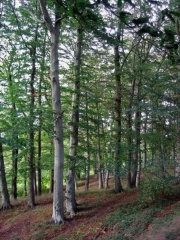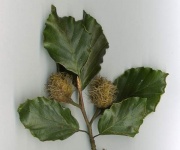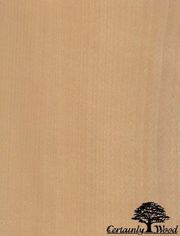Difference between revisions of "European beech"
Jump to navigation
Jump to search
m (Text replace - "== Authority ==" to "== Sources Checked for Data in Record ==") |
|||
| (3 intermediate revisions by the same user not shown) | |||
| Line 1: | Line 1: | ||
| − | [[File:BeechesF5.jpg|thumb|European beech | + | [[File:BeechesF5.jpg|thumb|European beech ''Fagus sylvatica'']] |
| − | |||
| − | ''Fagus sylvatica'']] | ||
== Description == | == Description == | ||
| − | A large, deciduous tree, ''Fagus sylvatica'', native to northern Europe. Beech trees have a smooth gray bark and a hard, heavy wood. European beech trees are often grown in large hedgerows. The reddish-brown, close-grain beechwood bends well and gives a smooth shiny finish. Beech is a commonly used timber for flooring, cabinetry, furniture, veneer, tool handles, and turnery. It was occasionally used in panel paintings in western Europe. | + | A large, deciduous tree, ''Fagus sylvatica'', native to northern Europe. [[Beech]] trees have a smooth gray bark and a hard, heavy wood. European beech trees are often grown in large hedgerows. The reddish-brown, close-grain beechwood bends well and gives a smooth shiny finish. Beech is a commonly used timber for flooring, cabinetry, furniture, veneer, tool handles, and turnery. It was occasionally used in panel paintings in western Europe. |
== Synonyms and Related Terms == | == Synonyms and Related Terms == | ||
| Line 10: | Line 8: | ||
''Fagus sylvatica''; Almindelig Bøg (Dan.); Rotbuche (Deut.); haya (Esp.); hêtre (Fr.); beuk (Ned.); Buk zwyczajny (Pol.); Bok (Sven.); faia (Port.); faggio (It.); beechwood; common beech | ''Fagus sylvatica''; Almindelig Bøg (Dan.); Rotbuche (Deut.); haya (Esp.); hêtre (Fr.); beuk (Ned.); Buk zwyczajny (Pol.); Bok (Sven.); faia (Port.); faggio (It.); beechwood; common beech | ||
| − | [[File:EuroBeechnutf5.jpg|thumb|European beech | + | [[File:EuroBeechnutf5.jpg|thumb|European beech ''Fagus sylvatica'']] |
| − | + | [[File:beechwc.jpg|thumb|Beech (''Fagus sylvatica'')]] | |
| − | ''Fagus sylvatica'']] | + | == Risks == |
| − | |||
| − | |||
| − | |||
| − | |||
| − | |||
| − | |||
| − | |||
| − | | | ||
| − | |||
| − | |||
| − | |||
| − | |||
| − | == | ||
Skin contact and dust inhalation may cause irritation and allergies. Highly acidic. May evolve volatile organic acids. | Skin contact and dust inhalation may cause irritation and allergies. Highly acidic. May evolve volatile organic acids. | ||
| + | == Physical and Chemical Properties == | ||
| − | == | + | * Large trees growing to 35 m. |
| − | + | * Bark= smooth, gray. | |
| − | + | * Leaves= simple with veins and toothed edges. | |
| − | + | * Fruit= Large husk containing 2 shiny brown edible nuts. | |
| − | + | * Wood is acidic. | |
| − | + | * Color: Pinkish brown with dark brown rays. | |
| − | + | * Rings: obscure. | |
| − | + | * Pores: diffuse, fine. | |
| − | + | * Grain: faint. | |
| + | * Rays: distinct. | ||
| + | * Hard, strong and heavy. | ||
| + | * Specific gravity = 0.7-0.9. | ||
| + | * Density = 45-55 ppcf | ||
| + | == Resources and Citations == | ||
| + | * Schoch, W., Heller, I., Schweingruber, F.H., Kienast, F., 2004: [http://www.woodanatomy.ch/ Wood anatomy of central European Species]: Beech, [http://www.woodanatomy.ch/species.php?code=FASY Fagus sylvatica L.] | ||
| − | + | * Alden Identification Services, Microscopic Wood Identification: [https://wood-identification.com/wood-types/ Link] | |
| − | * | + | * Virginia Tech Dendrology website at www.fw.vt.edu/dendro/dendrology/main.htm (accessed Oct. 8, 2005) |
| − | * Wikipedia | + | * Wikipedia: http://en.wikipedia.org/wiki/European_Beech (Accessed Oct. 8, 2005) |
* F. H. Titmuss, ''Commercial Timbers of the World'', The Technical Press Ltd., London, 1965 | * F. H. Titmuss, ''Commercial Timbers of the World'', The Technical Press Ltd., London, 1965 | ||
Latest revision as of 16:14, 5 August 2022
Description
A large, deciduous tree, Fagus sylvatica, native to northern Europe. Beech trees have a smooth gray bark and a hard, heavy wood. European beech trees are often grown in large hedgerows. The reddish-brown, close-grain beechwood bends well and gives a smooth shiny finish. Beech is a commonly used timber for flooring, cabinetry, furniture, veneer, tool handles, and turnery. It was occasionally used in panel paintings in western Europe.
Synonyms and Related Terms
Fagus sylvatica; Almindelig Bøg (Dan.); Rotbuche (Deut.); haya (Esp.); hêtre (Fr.); beuk (Ned.); Buk zwyczajny (Pol.); Bok (Sven.); faia (Port.); faggio (It.); beechwood; common beech
Risks
Skin contact and dust inhalation may cause irritation and allergies. Highly acidic. May evolve volatile organic acids.
Physical and Chemical Properties
- Large trees growing to 35 m.
- Bark= smooth, gray.
- Leaves= simple with veins and toothed edges.
- Fruit= Large husk containing 2 shiny brown edible nuts.
- Wood is acidic.
- Color: Pinkish brown with dark brown rays.
- Rings: obscure.
- Pores: diffuse, fine.
- Grain: faint.
- Rays: distinct.
- Hard, strong and heavy.
- Specific gravity = 0.7-0.9.
- Density = 45-55 ppcf
Resources and Citations
- Schoch, W., Heller, I., Schweingruber, F.H., Kienast, F., 2004: Wood anatomy of central European Species: Beech, Fagus sylvatica L.
- Alden Identification Services, Microscopic Wood Identification: Link
- Virginia Tech Dendrology website at www.fw.vt.edu/dendro/dendrology/main.htm (accessed Oct. 8, 2005)
- Wikipedia: http://en.wikipedia.org/wiki/European_Beech (Accessed Oct. 8, 2005)
- F. H. Titmuss, Commercial Timbers of the World, The Technical Press Ltd., London, 1965
- G.S.Brady, Materials Handbook, McGraw-Hill Book Co., New York, 1971 Comment: p. 93
- Hermann Kuhn, Conservation and Restoration of Works of Art and Antiquities, Butterworths, London, 1986
- Caring for your Collections, Arthur W Schulz (ed.), Harry N. Abrams, Inc. , New York, 1992
- Michael McCann, Artist Beware, Watson-Guptill Publications, New York City, 1979
- George Savage, Art and Antique Restorer's Handbook, Rockliff Publishing Corp, London, 1954
- Pam Hatchfield, Pollutants in the Museum Environment, Archetype Press, London, 2002


